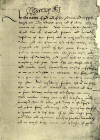
According to the statutes that circumscribed Henry VIII's ability to settle the government and the care of his successor during his minority, Henry VIII could not appoint a Protector. However in his last will (dated 30 Dec 1546) he appointed sixteen executors to carry out government and care of the King.
Henry's will
At their first meeting on 31 Jan 1547 (three "unimportant" executors being absent), and before they had taken their oath of office, the executors decided that Edward Seymour, Earl of Hertford, should be made Protector:
We therefore, the Archbishop and others whose names be hereunto subscribed, by one whole assent, concord, and agreement, upon mature consideration of the tenderness and proximity of blood between our Sovereign Lord that now is and the said Earl of Hertford, being his uncle ... [have] given unto him the first and chief place amongst us, and also the name and the title of the Protector of all the realms and dominions of the King's Majesty that now is, and of the Governor of his most royal person; with this special and express condition, that he shall not do any act but with the advice and consent of the rest of the coexecutors in such manner, order, and form as in the said will of our said late Sovereign Lord and most gracious Master is appointed and prescribed; which the said Earl has promised to perform accordingly.
On the next day, 1 Feb 1547, the executors swore the oath to observe the will, and proceeded to lay before Edward VI their cited action. The King gave his assent to Hertford's appointment as Protector "of his realms and dominions and Governor of his person" and the decision was declared to the House of Lords, which gave its unanimous consent. Thus Hertford became Protector on 1 Feb 1547 (created Duke of Somerset on 16 Feb 1547).
As the executors had scruples regarding the question of whether decisions by the Protector could bind the King, they addressed a petition to Edward VI, asking him to appoint them the members of the King's Privy Council and to give them authority to authorize the (acting) Keeper of the Great Seal to seal a commission by virtue of which Protector and Council would have full authority. This petition was granted, and the requested commission was issued on 13 Mar 1547 and "entered in the Council-book" on 21 Mar 1547:
We for a full and perfect declaration of the authority to our said uncle given and appointed as is aforesaid, do nominate, appoint and ordain our said uncle Governor of our said person and Protector of our said realms and dominions and of the subjects of the same, until such time as we shall have by the sufferance of God accomplished the age of eighteen years.
From 13 Mar 1547 the executors have merged into the King's Privy Council, which acquired a greater authority to dismiss the Protector two years later. The Duke of Somerset was proclaimed a traitor by the Council on 8 Oct 1549 and arrested on 10 Oct 1549. After the fall of Somerset, the Council did not appoint a new protector. John Dudley, who took a leading part in the dismissal of Somerset, became one of the six prime attendants on the King and gradually attained the authority close to that of Somerset. He was made the Duke of Northumberland on 11 Oct 1549 and influenced the king's policies until the latter's death on 6 Jul 1553.
The Executors (as of 31 Jan 1547)
| - Thomas Cranmer, Archbishop of Canterbury |
| - Edward Seymour, Earl of Hertford (thereafter Duke of Somerset) |
| - John Russell (thereafter Baron Russell, Earl of Bedford) |
| - John Dudley, Viscount Lisle (thereafter Earl of Warwick, Duke of Northumberland) |
| - Sir Anthony Denny |
| - Sir William Herbert (thereafter Earl of Pembroke) |
| - Thomas Wriothesley (thereafter Earl of Southampton) |
| - Cuthbert Tunstall, Bishop of Durham |
| - Sir Anthony Browne ("the elder") |
| - Sir Edward Wotton |
| - Dr Nicholas Wotton, Dean of Canterbury and York |
| - William Paulet, Baron St John of Basing (thereafter Earl of Wiltshire, Marquis of Winchester) |
| - Sir William Paget (thereafter Baron Paget) |
| - Sir Edward North |
| - Sir Edward Montague, Chief Justice of the Common Pleas |
| - Sir Thomas Bromley, Chief Justice of the King's Bench |
Sources:
A.F.Pollard, "England
Under Protector Somerset", 1900, reissued 1966.
 to Life Page
to Life Page |
 to
Henry VIII Page to
Henry VIII Page |
 to Home Page
to Home Page |